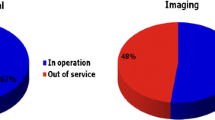Abstract
Data Envelopment Analysis (DEA) was used to measure efficiency of residential mental health facilities. The sample consisted of 50 half-way houses, 8 nursing homes, and 32 sheltered homes. In total, 68 facilities belonged to the public sector and were 22 supervised by private non-profit organizations. Variables chosen to characterize production were: structure size (m2), staff, salaries and operational costs, and the output measure was patient numbers. An input oriented DEA model, allowing for variable returns to scale, was applied and units were ranked according to a benchmarking approach. Mean efficiency, for the whole sample, was 73.2% and 18 best practice units were found, on average, 33.1% over-efficient. The other 72 were under-performing, with 54 appearing more than 20% inefficient. The mean efficiency scores for public and private non-profit units were 68.8 and 86.6%, respectively, and significantly different (p < 0.001). Results suggest that efficiency improvements are possible with better use of resources but more research employing various data sets is required.
Similar content being viewed by others
References
Madianos, M. G., Tsiantis, J., and Zacharakis, C., Changing patterns of mental health care in Greece (1984–1996). Eur. Psychiatry 14:1, 1999.
Madianos, M. G., Zacharakis, C., Tsitsa, C., and Stefanis, C., The mental health care delivery system in Greece: Regional variation and socioeconomic correlates. J. Mental Health Policy Econ. 2:169, 1999.
Madianos, M. G., Deinstitutionalization and the closure of public mental hospitals. Int. J. Mental Health 31:66, 2002.
Hogan, R., Community opposition to group homes. Soc. Sci. Quart. 67:442, 1986.
Feldstein, M., Economic Analysis for Health Services Efficiency, Markham Publishing Company, Chicago, 1968.
Conrad, R. F., and Strauss, R., A multiple-output multiple-input model of the hospital industry in North Carolina. Appl. Econ. 15:341, 1983.
Cowing, T., and Holtman, A., Multiproduct short-run hospital cost functions: Empirical evidence and policy implications from cross-section data. South. Econ. J. 49:637, 1983.
Li, L. X., and Benton, W. C., Performance measurement criteria in health care organizations: Review and future research directions. Eur. J. Oper. Res. 93:449, 1995.
Charnes, A., Cooper, W. W., and Rhodes, E., Measuring efficiency of decision-making units. Eur. J. Oper. Res. 3:429, 1978.
Banker, R. D., Charnes, A., and Cooper, W. W., Models for estimating technical and scale efficiencies in data envelopment analysis. Manag. Sci. 30:1078, 1984.
Giuffrida, A., and Gravelle, H., Measuring performance in primary care: Econometric analysis and DEA. Appl. Econ. 33:163, 2001.
Cooper, W. W., Seiford, L. M., Thanassoulis, E., and Zanakis, S. H., DEA and its use in different countries. Eur. J. Oper. Res. 154:337, 2004.
Bowlin, W. F., Measuring performance: An introduction to data envelopment analysis (DEA). J. Cost Anal. 3:3, 1998.
Hollingsworth, B., Dawson, P., and Maniadakis, N., Efficiency measurement of health care: A review of non-parametric methods and applications. Health Care Manag. Sci. 2:161, 1999.
Hollingsworth, B., Non-parametric and parametric applications measuring efficiency in health care. Health Care Manag. Sci. 6:203, 2003.
Rosko, M. D., Chilingerian, J. A., Zinn, J. S., and Aaronson, W. E., The effects of ownership, operating environment, and strategic choices on nursing-home efficiency. Med. Care 33:1001, 1995.
Chattopadhyay, S., and Ray, C. S., Technical, scale and size efficiency in nursing home care: A non-parametric analysis of Connecticut homes. Health Econ. 5:363, 1996.
Bjorkgren, M. A., Hakkinen, U., and Linna, M., Measuring efficiency of long-term care units in Finland. Health Care Manag. Sci. 4:193, 2001.
Yeh, J., White, K. R., and Ozcan, Y. A., Efficiency evaluation of community-based youth services in Virginia. Commun. Mental Health J. 33:487, 1997.
Tyler, L. H., Ozcan, Y. A., and Wogen, S. E., Mental health case management and technical efficiency. J. Med. Sys. 19:413, 1995.
Ozcan, Y. A., McCue, M. J., and Okasha, A. A., Measuring the technical efficiency of psychiatric hospitals. J. Med. Sys. 20:141, 1996.
Knapp, M., Economic evaluation and mental health: Sparse past ..fertile future? J. Mental Health Policy Econ. 2:163, 1999.
Allen, R., Athanassopoulos, A., Dyson, A. G., and Thanassoulis, E., Weight restrictions and value judgments in data envelopment analysis: Evolution, development and future directions. Ann. Oper. Res. 73:13, 1997.
Pedraja-Chaparro, F., Salinas-Jimenez, J., Smith, P., On the quality of the data envelopment analysis model. J. Oper. Res. Soc. 50:636, 1999.
Smith, P., Model misspecification in data envelopment analysis. Ann. Oper. Res. 73:233, 1997.
Ruggiero, J., A new approach for technical efficiency estimation in multiple output production. Eur. J. Oper. Res. 111:369, 1998.
Galagedera, D. U., and Silvapulle, P., Experimental evidence on robustness of data envelopment analysis. J. Oper. Res. Soc. 54:654, 2003.
Andersen, P., and Petersen, N. C., A procedure for ranking efficient units in data envelopment analysis. Manag. Sci. 39:1261, 1993.
Torgersen, A. M., Forsund, F. R., Kittlesen, S. A., Slack-adjusted efficiency measures and ranking of efficient units. J. Prod. Anal. 7:379, 1996.
The EMS Homepage. http://www.wiso.uni-dortmund.de/lsfg/or/scheel/ems/.
Evers, S. M., Van Wijk, A. S., and Ament, J. H., Economic evaluation of mental health care interventions. A review. Health Econ. 6:161, 1997.
Walsh, K. K., Kastner, T. A., and Gentlesk-Green, R., Cost comparisons of community and institutional residential settings: Historical review of selected research. Mental Retard. 41:103, 2003.
Mason, K., Olmos-Gallo, A., Bacon, D., McQuilken, M., Henley, A., and Fisher, S., Exploring the consumers and providers perspective on service quality in community mental health care. Commun. Mental Health J. 40:33, 2004.
Thanassoulis, E., Boussofiane, A., and Dyson, R. G., Exploring output quality targets in the provision of perinatal care in England using data envelopment analysis. Eur. J. Oper. Res. 80:588, 1995.
Author information
Authors and Affiliations
Corresponding author
Rights and permissions
About this article
Cite this article
Kontodimopoulos, N., Bellali, T., Labiris, G. et al. Investigating Sources of Inefficiency in Residential Mental Health Facilities. J Med Syst 30, 169–176 (2006). https://doi.org/10.1007/s10916-005-7981-4
Received:
Accepted:
Issue Date:
DOI: https://doi.org/10.1007/s10916-005-7981-4




